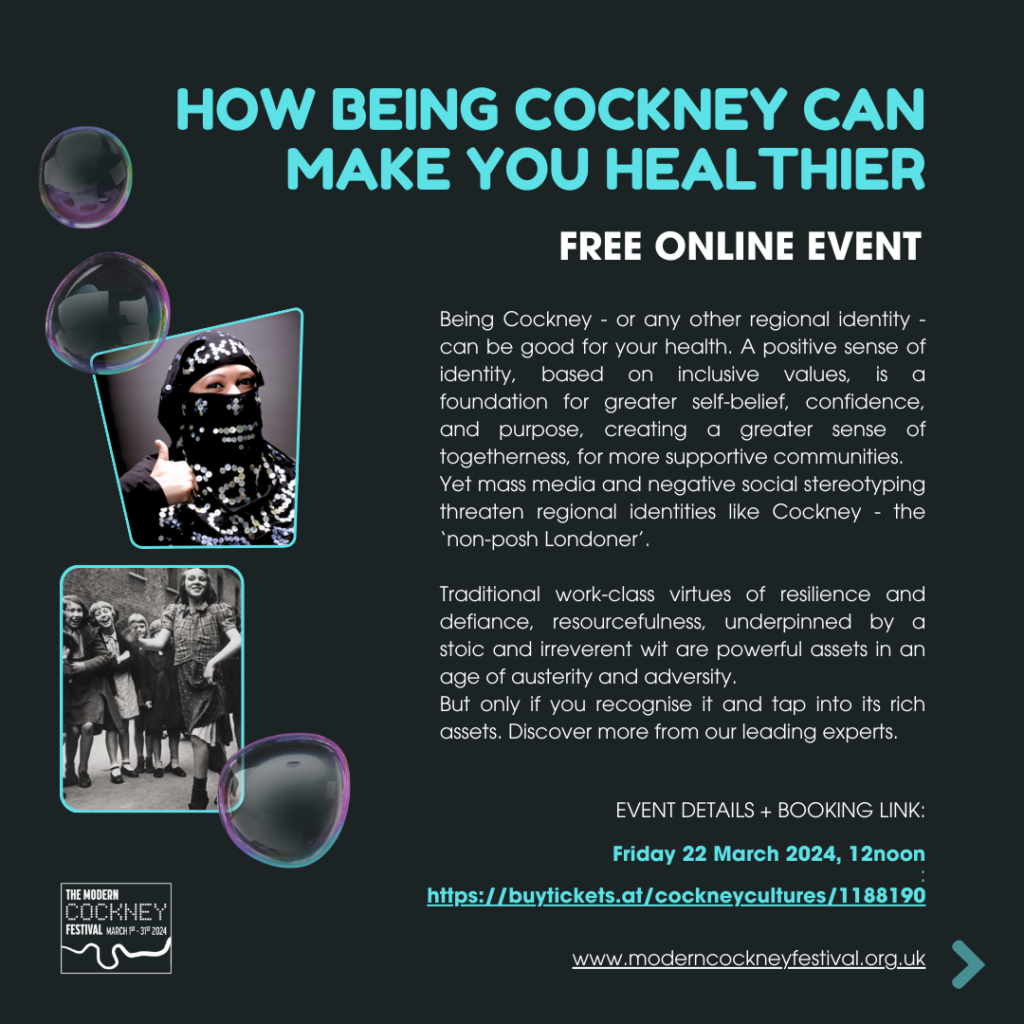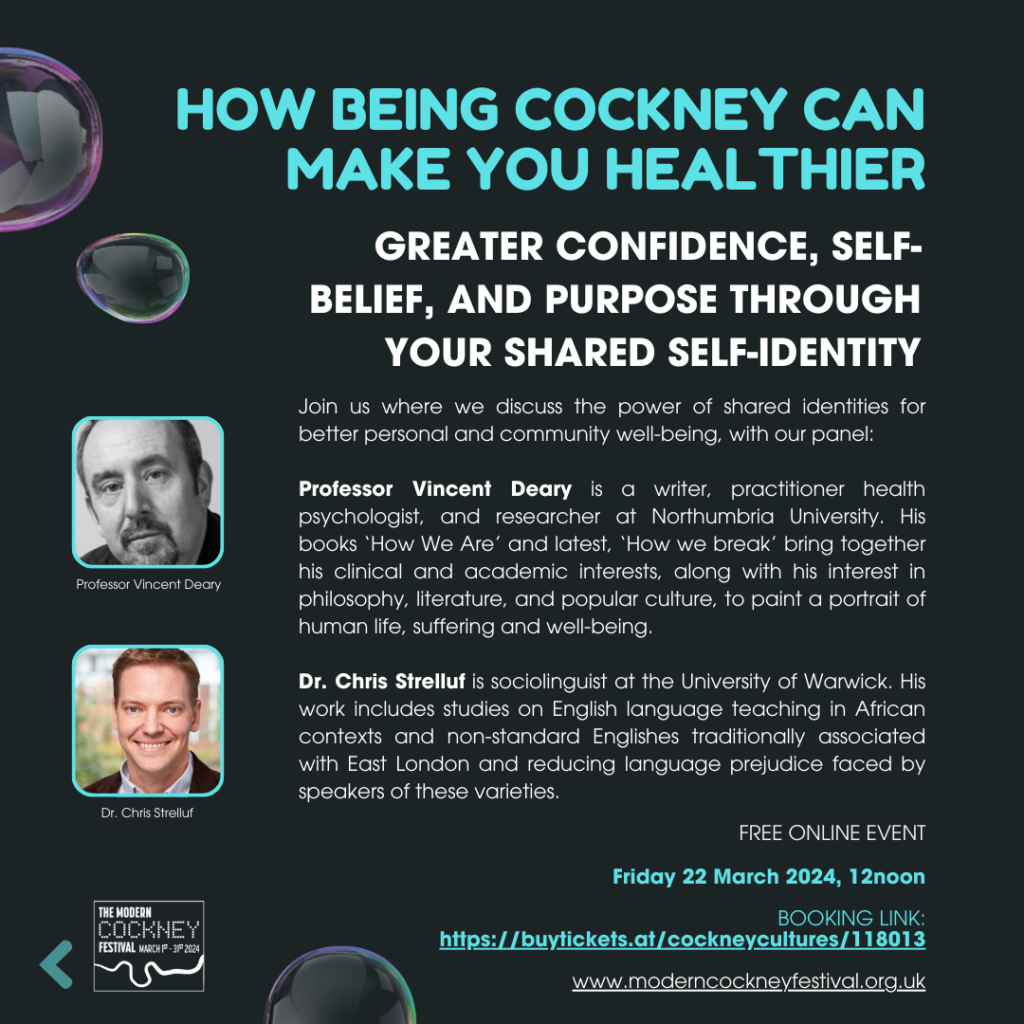Book Tickets Here: https://buytickets.at/cockneycultures/1188190
How being Cockney – or any other regional identity – can make you healthier
Being Cockney can be good for your health – likewise for Brum, Geordie, Scouse, and Weegie – with evidence revealing how your sense of identity is a foundation for a better sense of self-belief, confidence, and purpose, according to leading health and well-being experts.
In post-Brexit Britain, where regional identities are under threat from mass media and negative social stereotyping, supporting local identities like Cockney – the ‘non-posh Londoner’- can help people’s well-being if given active support, as well as helping to assert a sense of ‘Britishness’ at a time of ambiguity and uncertainty around national identities.
The Modern Cockney Festival is bringing together experts in well-being and social identities, in an online event ‘How being a Cockney can make you healthier’ at 12 noon on Friday March 22nd.
It highlights the potential benefits of shared social identities, like Cockney, based on positive, inclusive values, can be a powerful force for a greater sense of togetherness and for communities to be more mutually supportive.
The issue is pertinent to all regional identities across the UK. Campaigners believe that unless these identities are recognised for their positive and relevant value to the needs of modern-day life, their decline will continue.
Speaking at the event is one of the UK’s leading experts on well-being, Professor Vincent Deary, writer, practitioner health psychologist, and researcher at Northumbria University. His books ‘How We Are’ and latest, ‘How We Break’ bring together his clinical and academic interests, along with his interest in philosophy, literature, and popular culture, to paint a portrait of human life, suffering and well-being.
Commenting on how social identities can be harnessed for greater well-being, Professor Deary said, “Self-compassion is often most difficult precisely when we need it most; when we are suffering, struggling, or ‘failing’. Having a strong sense of belonging can help support that capacity for self-compassion. The converse is also true, feeling like you don’t belong is one of the reasons many of us struggle in the first place.”
Campaigners highlight how traditional work-class values of being resilient and defiant, resourceful, underpinned by a stoic and irreverent wit can be powerful assets in an age of austerity and adversity, enable people and communities to be more purposeful today and tomorrow.
Reflecting about the Cockney identity, Saif Osmani cofounder of the Modern Cockney Festival said, “In the same way some feel passionate about their Irish, Jewish or other identity, a sense of being a Cockney, a ‘non-posh Londoner’ can inspire people to realise their greater potential, making the most of themselves, and their shared identity – but only if they recognize and tap into its rich assets, and by asserting its positive, inclusive values”.


Also speaking at the event is Dr. Christopher Strelluf a sociolinguist at the University of Warwick. His work includes studies of non-standard Englishes traditionally associated with East London and reducing language prejudice faced by speakers of these varieties and is co-author of ‘A Cockney Blueprint for Tower Hamlets’.
Dr Strelluf noted, “The language we use is central to our personal and social identities. When people make judgments about our language, they are making judgments about our fundamental selves. Negative social evaluations of language have real consequences for educational, economic, and social wellbeing.”
The Modern Cockney Festival is a month-long celebration of the culture, heritage, and future of ‘non-posh Londoners’ aka Cockneys. It features the launch of a virtual Modern Cockney Museum, live and online events, lectures, talks, family fun days, the Modern Cockney Kids festival, and the first-ever National Pie’n’Mash Week.
It is a community partnership between the East End Bengali Heritage Society and social enterprise Grow Social Capital.
The Festival celebrates a Cockney identity of the ‘non-posh Londoner’, a term first coined by comedian Arthur Smith. An identity characterised by values of being resilient and defiant, resourceful, underpinned by a stoic and irreverent wit, with four key types:
· ‘Old School Cockney’ found in traditional heartlands of inner London, akin to the popular stereotypes with a working-class London accent, language, and culture, use of rhyming slang, and other tropes.
· ‘New School Cockney’ a product of the latest emergent culture of ‘non-posh Londoners’.
· ‘Cockney Diaspora’ with an affinity to the ‘non posh Londoner’ living outside the traditional Cockney heartlands of inner London, and retaining aspects of the traditional heartland’s language, accent, and attitudes.
· ‘Ancestral Cockney’ an affinity with the culture and heritage of the ‘non posh Londoner’ second, third or more generation removed from living in the traditional Cockney heartlands.
Further details about the Modern Cockney Festival, and to book tickets for the Festival’s other free events visit www.moderncockneyfestival.org.uk
ENDS
For further details Modern Cockney Festival: Contact Andy Green 07815 884 525 or email [email protected]
How We Break by Professor Vincent Deary
What happens when our minds and bodies are pushed beyond their limits? Vincent Deary is a health psychologist who has spent years helping his patients cope with whatever life has thrown at them. In How We Break, he has written a book for all of us who sometimes feel we have reached our breaking point. Drawing on clinical case studies, cutting-edge scientific research, intimate personal stories and references from philosophy, literature and film, How We Break offers a consoling new vision of everyday human struggle. The big traumas in life, Deary points out, are relatively rare. More common is when too many things go wrong at once, or we are exposed to prolonged periods of difficulty or precarity. When the world shrinks to nothing but our daily coping, we become unhappy, worried, hopeless, exhausted. In other words, we break.
Breaking, he shows us, happens when the same systems that enable us to navigate through life become dysregulated. But if we understand how the wear and tear of life affects us, then we have a better chance of navigating through times of burnout, stress, fatigue and despair. By equipping us with a better understanding of what happens to us when we’re struggling to cope, and making a bold case for the power of rest and recuperation, How We Break helps chart a path through difficult times.
https://www.penguin.co.uk/books/273528/how-we-break-by-deary-vincent/9780241008355